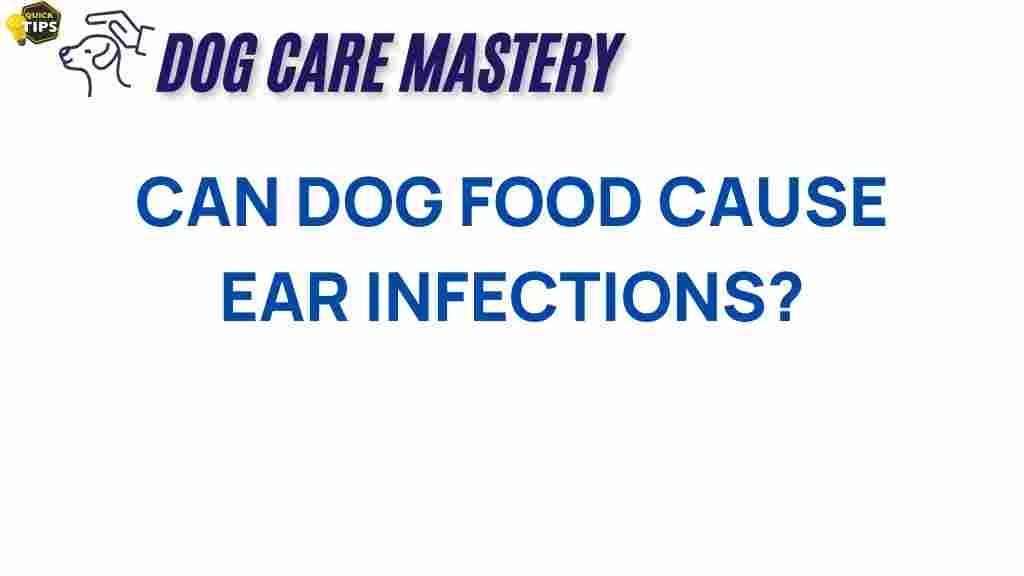Unveiling the Link: Can Dog Food Cause Ear Infections?
As a dog owner, understanding the health and well-being of your furry friend is of utmost importance. Among the various health issues that can affect dogs, ear infections are a common concern. While many factors contribute to this ailment, one area that often raises questions is the role of dog food. Can your dog’s diet really influence the likelihood of ear infections? In this article, we will delve into the connection between dog food and ear infections, providing valuable insights and tips for pet owners.
Understanding Ear Infections in Dogs
Before we explore the potential link between dog food and ear infections, it’s essential to understand what ear infections are and how they can affect your pet. An ear infection, medically known as otitis, can occur in various parts of the ear: the outer ear (otitis externa), middle ear (otitis media), and inner ear (otitis interna). Symptoms of ear infections in dogs may include:
- Excessive scratching or pawing at the ears
- Head shaking or tilting
- Foul odor emanating from the ears
- Redness or swelling in the ear canal
- Discharge from the ear
Ear infections can be painful and may lead to more severe health issues if left untreated. Therefore, identifying the root cause is crucial for effective treatment.
The Role of Dog Food in Ear Health
One of the many factors that can contribute to ear infections in dogs is their diet. Poor nutrition can weaken a dog’s immune system, making them more susceptible to infections. Furthermore, certain ingredients in dog food may trigger allergic reactions, leading to inflammation and infections in the ears. Here are some key ways that dog food can influence ear health:
1. Allergies and Sensitivities
Many dogs suffer from food allergies and sensitivities, which can manifest in various ways, including skin irritations and ear infections. Common allergens found in dog food include:
- Beef
- Dairy
- Chicken
- Wheat
- Soy
When a dog consumes food containing these allergens, their immune system may respond by triggering inflammation, which can lead to ear infections.
2. Quality of Ingredients
The quality of ingredients in dog food plays a significant role in overall health. Low-quality dog food often contains fillers, artificial additives, and preservatives that can compromise a dog’s immune system. Opting for high-quality, natural dog food can help reduce the risk of infections by promoting overall health.
3. Omega Fatty Acids
Omega-3 and Omega-6 fatty acids are essential for maintaining healthy skin and coat, which in turn can affect ear health. These fatty acids help reduce inflammation, making them beneficial for dogs prone to ear infections. Look for dog food that includes sources of omega fatty acids, such as:
- Fish oil
- Flaxseed
- Chia seeds
Step-by-Step Process: How to Choose the Right Dog Food
Choosing the right dog food can be overwhelming, but following these steps can help ensure you select a diet that promotes ear health:
Step 1: Identify Allergens
If you suspect that your dog may have food allergies, consult your veterinarian for an allergy test or elimination diet. This process will help you identify specific ingredients that may be causing issues.
Step 2: Read Labels
When shopping for dog food, pay close attention to the ingredient list. Look for:
- High-quality protein sources
- Whole grains or grain-free options
- Natural preservatives
Avoid products with vague terms like “meat by-products” and artificial additives.
Step 3: Consult Your Veterinarian
Always consult your veterinarian for recommendations on the best dog food for your pet’s specific needs. They can provide insight based on your dog’s health conditions and dietary requirements.
Step 4: Monitor Your Dog’s Health
Once you’ve switched to a new diet, keep an eye on your dog’s health, especially their ears. Look for improvements in symptoms and overall well-being.
Troubleshooting Tips for Ear Infections
If your dog is experiencing ear infections, here are some troubleshooting tips to consider:
1. Regular Ear Cleaning
Maintaining clean ears is crucial for preventing infections. Use a vet-recommended ear cleaner and follow these steps:
- Gently lift your dog’s ear flap.
- Apply the cleaner and massage the base of the ear.
- Wipe away excess cleaner with a cotton ball.
2. Avoid Water in the Ears
When bathing your dog, be cautious to avoid getting water in their ears. Ear infections can be exacerbated by moisture in the ear canal.
3. Monitor for Allergic Reactions
Keep track of any changes in your dog’s behavior or health after changing their dog food. If you notice signs of an allergic reaction, consult your vet immediately.
4. Consider Supplements
Omega fatty acid supplements can benefit dogs prone to ear infections. Discuss with your veterinarian whether this is a suitable option for your pet.
Conclusion: Maintaining Ear Health Through Diet
In conclusion, while dog food is not the sole cause of ear infections, it undoubtedly plays a significant role in your dog’s overall health and susceptibility to this condition. By understanding the connection between dog food and ear infections, you can make more informed decisions regarding your pet’s diet. Prioritizing high-quality ingredients, monitoring for allergies, and maintaining regular ear care can help keep your furry friend healthy and happy.
If you are looking for additional resources on dog care, consider visiting this guide. For more information on pet nutrition, check out this external link.
This article is in the category Health and created by dogcaremastery Team

1 thought on “Unveiling the Link: Can Dog Food Cause Ear Infections?”